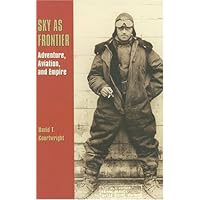
Average Reviews:

(More customer reviews)What makes flying so exciting? David Courtwright, a friend and colleague at the University of North Florida, has some fascinating ideas on the subject. "Sky as Frontier" is an impressive reinterpretation of the social history of flight in America. He casts the story as a frontier epic, but not exactly as has been done previously. While words like "pioneer," "conquest," and "frontier" have been used many times to describe the development of flight, in Courtwright's hands they take on a more nuanced, imaginative, and provocative cast. At several levels, he sees the frontier as a useful metaphor for describing the aeronautical experience in America.
Taking his cue from the sociological analysis first offered by Murray Melbin, who codified the social ingredients of a frontier as one in which itinerant young men predominated, danger lurked, and vices abounded, Courtwright systematically applies this model to the aeronautical enterprise. "The first to venture onto that frontier had been mostly adventurous young men," Courtwright notes. "Then came the rich and hurried. Then just about everybody" (p. ix). Using this framework the author then traces flight from its early daredevil days, very much a frontier environment, to one that was both domesticated and routine in which anyone may participate. His cover illustration captures that early "wild" era well, with airmail pilot "Wild Bill" Hopson decked out in his flying gear, smoking a cigarette, and paused in mid-swagger. From Hopson to Charles Lindbergh to Chuck Yeager to the button-down pilots of the modern airlines Courtwright shows this process of subjugation of a frontier. Of course, there is still on bastion of the frontier of flight, military fighters, whose pilots still epitomize aviation's dangers.
Courtwright's final chapter explores the manner in which Americans have commemorated the evolution of flight, and embraced its frontier aspects. He notes that the visitors to the National Air and Space Museum, where I work as a curator, are largely interested in the excitement of this twentieth century frontier. They drink in the stories of those who flew in war or worked to send Americans to the Moon in the 1960s or helped advance the capabilities of flight. This shrine to American flight technology has power precisely because of its connection to these "frontier" stories.
I am pleased to recommend this book to all interested in the history of flight. It appeared as a volume in the "Centennial of Flight Series" published by Texas A&M University Press, for which I serve as series editor. Enjoy this outstanding work!
Click Here to see more reviews about: Sky as Frontier: Adventure, Aviation, and Empire (Centennial of Flight Series)
When the Wright brothers invented their flying machine, Americans lived in a nation of two dimensions, circumscribed by lines drawn on a conventional map. A century later, their nation existed--in fact, reigned--in three dimensions. Two million Americans "slipped the surly bonds of earth" daily, carried aloft by aircraft operating in every part of the world.The airplane turned the sky into a new domain of human activity, a fast-developing frontier first braved by adventurous young men. Then came the rich and the hurried, followed by just about everybody else. Until now, no one has told the story of aviation as one of frontier expansion.Aviation's frontier stage lasted a scant three decades, then vanished as flying became a settled experience. Sky as Frontier shows how commercial and military imperatives destroyed this pioneer world by routinizing flight. Along the way, Courtwright stops to consider dogfighting, barnstorming, the first air mail pilots, the development of airlines, air power during World War II, flight's impact on the environment, the troubled space frontier, and how the male-dominated aviation enterprise was domesticated and democratized.The history of American flight shows a fateful trade-off. Rationalization killed the adventure in flying but made possible rapid aerial expansion. With it came commercial growth and global military reach. In no other country did social life, business, and military operations become so intertwined with aerospace advances or have such large consequences for national power and prestige.--This text refers to the Hardcover edition.

0 comments:
Post a Comment